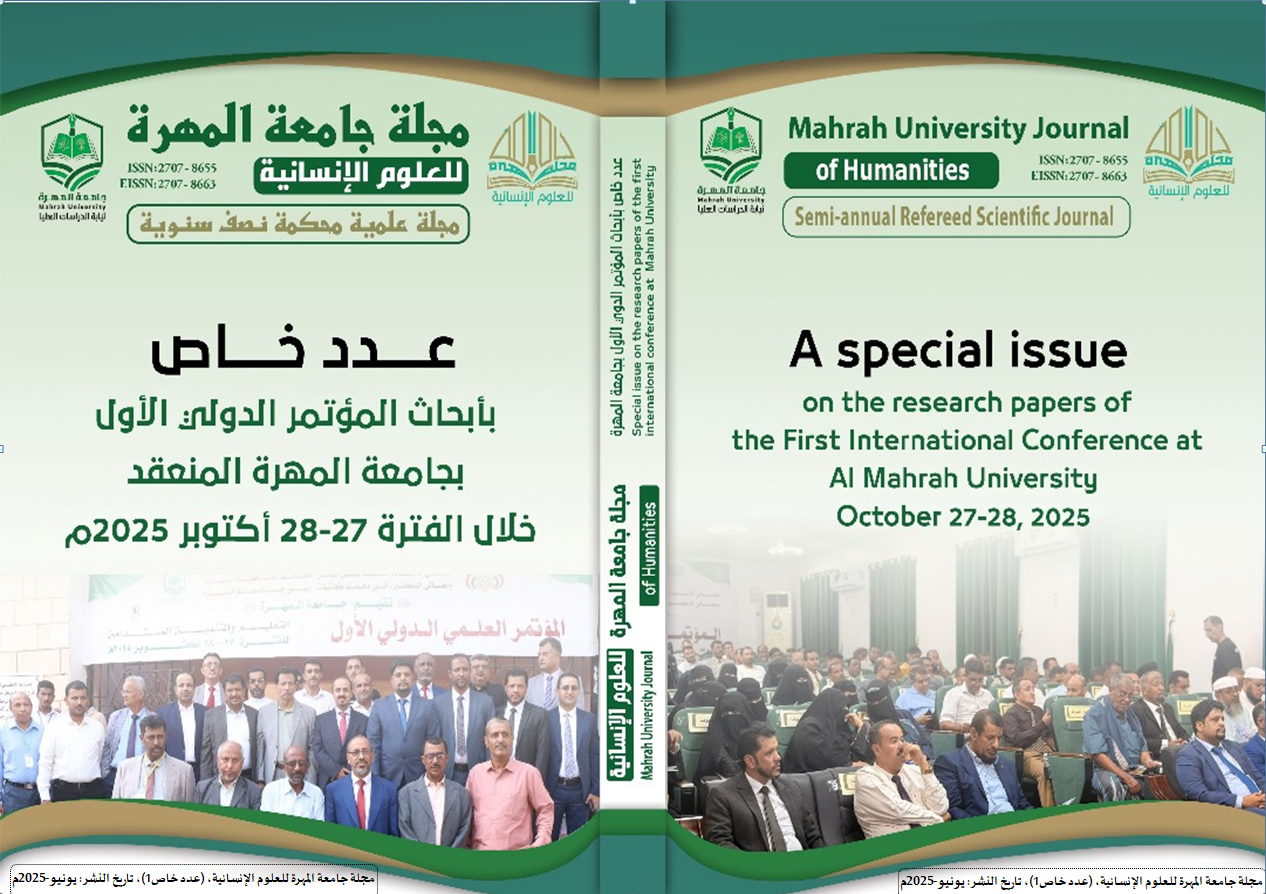Literature as a Powerful Force in Creating Social Stability (An Anthropological Study)
DOI:
https://doi.org/10.71311/.v6iS1.174Keywords:
Literature, Powerful Force, Social Stability, AnthropologyAbstract
This research sought to study the topic (Literature as an effective force in creating societal stability, an anthropological study), tracing the values and human aspects and their relationship with reality, culture, behavior, and practices. It also provided an overview of the effectiveness of literature and its impact, by tracking the anthropological functions, and how to search for aspects influencing the change in psychological, social and cultural reality, and monitoring the process of creative influence on the recipient and making him more capable of understanding, thinking and tasting, by presenting examples of literary texts, analyzing them and monitoring their dimensions. Explaining its impact on the nature of the soul and life and monitoring its ability to achieve stability, security and construction. Literature is a wide-ranging means that instills the quality of acceptance of the other, individually, in societies, and in culture. It gives an image of understanding with others, excluding them, in an accepting, sentimental form. Hence, dealing with others disappears, and it encourages tolerance and understanding, and here produces stability and harmony and draws cooperation between people. Perhaps the method most capable of tracking these elements and those relationships between literature and the reality of society is the anthropological method.
Downloads
References
الأسد، ناصر الدين، مصادر الشعر الجاهلي، دار المعارف بمصر، الطبعة السابعة 1988م.
الجابري، في المثل والتمثيل وضرب الأمثال، مبارك العلمي، المجلة الإلكترونية،1997، ع35.
الجاسم، عائشة، الأدب والقيم كيان واحد، مقال منشور على موقع الراية القطرية، الثلاثاء, 28 يناير, 2020م.
الجرجاني، عبد القاهر، دلائل الإعجاز، تحقيق: عبد الحميد هنداوي، دار الكتب العلمية – بيروت، الطبعة الأولى 2001م.
حمداوي، جميل، النقد الأدبي الأنثروبولوجي بين النظرية والتطبيق، (قراءة ثانية لشعرنا القديم، مصطفى ناصف أنموذجا)، دار الريف للطباع والنشر، المغرب، ط1، 2019م.
رعدان، عبد الكريم حسين، خصائص الأسلوب الأدبي والبلاغي في العصرين الجاهلي والإسلامي، نور حوران للدراسات والنشر والتراث، دمشق، الطبعة الأولى 2019م.
الزبيدي، عبد الحكيم، التناص في الأمثال الشعبية الإماراتية، جامعة الشارقة- الإمارات العربية المتحدة، ديسمبر 2019م.
زغب، أحمد، الأدب الشّعبيّ الدّرس والتّطبيق، مطبعة مزوار الوادي، ط2 2008م،
زكي، عماد، دموع على سفوح المجد، دار القلم، دمشق.
الزوزني، حسين، شرح المعلقات السبع، دار احياء التراث العربي، الطبعة الأولى 2002م.
السماعيل، شوق، دور الثقافة الأدبية في عصرنا الحديث وهل تصنع تاريخا، مقال منشور على موقع الوطن السعودية، بتاريخ: الأربعاء 17 نوفمبر 2021 - 12 ربيع الثاني 1443 هـ.
سميث، شارلوت سيمور، موسوعة علم الإنسان، المفاهيم و المصطلحات الأنثروبولوجية، ترجمة مجموعة من الأساتذة، بإشراف محمد الجوهري، المركز القومي للترجمة، مصر، 2009
الشنفرى، الديوان، جمعه وحققه: إميـل بـديع يعقـوب، دار الكتـاب العربـي، بيـروت، ط2، 1997م.
عبد الجبار، عبد الله - محمد عبد المنعم خفاجى، قصة الأدب في الحجاز، مكتبة الكلية الأزهرية.
علي، جواد، المفصل في تاريخ العرب قبل الإسلام، دار الساقي الطبعة الرابعة 2001م.
ابن قتيبة، الدينوري، الشعر والشعراء. دار الحديث، القاهرة 1423هـ.
القرشي، أبو الخطاب، جمهرة أشعار العرب، حققه: علي محمد البجادي، نهضة مصر للطباعة والنشر والتوزيع،
القيرواني، إبراهيم بن علي، زهر الآداب وثمر الألباب، دار الجيل.
القيرواني، ابن رشيق، العمدة في محاسن الشعر وآدابه ونقده، تحقيق: محمد محيي الدين عبد الحميد، دار الجيل، الطبعة الخامسة، 1981م.
الكومي، محمد شبل، مبادئ النّقد الأدبي والفنّي، دراسة في المنظر والمنظور، الهيئة العامة المصريّة للكتاب، القاهرة، ط1، 2007م،
مندور، محمد، في الميزان الجديد، نهضة مصر للطباعة والنشر والتوزيع، 2004م.
ابن منقذ، أسامة، لباب الآداب، تحقيق: أحمد محمد شاكر، مكتبة السنة، القاهرة، الطبعة الثانية 1987م.
الهروي، القاسم بن سلام، الأمثال، تحقيق: عبد المجيد قطامش، دار المأمون للتراث، الطبعة الأولى 1980.
Bock, P. K., & Leavitt, S. C. (2018). Rethinking Psychological Anthropology: A Critical History. Waveland press

Downloads
Published
How to Cite
Issue
Section
License
Copyright (c) 2025 أ.د. عبد الكريم حسين رعدان ، أ. د. عادل كرامة معيلي

This work is licensed under a Creative Commons Attribution 4.0 International License.
Copyright and Licensing
copyright is retained by the authors. Articles are licensed under an open access Creative Commons CC BY 4.0 license, meaning that anyone may download and read the paper for free. In addition, the article may be reused and quoted provided that the original published version is cited. These conditions allow for maximum use and exposure of the work.

